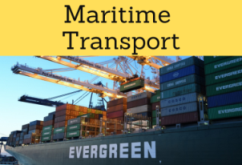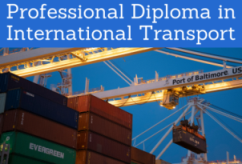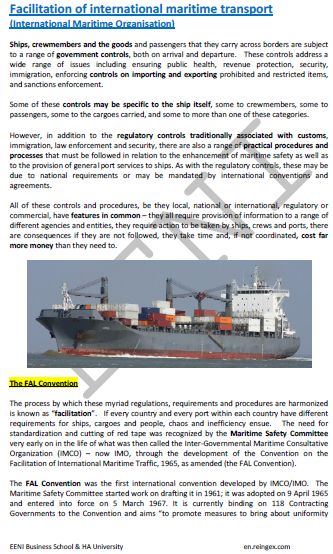International Maritime Organization (IMO)

International maritime security, FAL Convention, SOLAS, Transport of goods by Sea
- Introduction to the International Maritime Organization (IMO)
- Maritime Security
- Transport of goods and containers
- Cargo securing (packing)
- Fire protection
- Navigation
- Radio communications, search and rescue
- Stability and compartmentalization
- Safety rules for the different types of vessels
- Maritime cyber risk
- International maritime transport facilitation
- Convention on Facilitation of International Maritime Traffic (FAL)
- Electronic commerce applied to the maritime transport facilitation
- Maritime protection and piracy
- Piracy and armed robbery perpetrated against ships
- Fight against piracy in West Africa
- Djibouti Code of Conduct
- IMO Integrated Global Maritime Information System (GISIS)
- Conventions of the International Maritime Organization (IMO)
- Customs Convention on Containers
- Codes of the International Maritime Organization (IMO)

The Subject “International Maritime Organization (IMO)” belongs to the following Online Programs taught by EENI Global Business School:
Logistics Courses: Maritime transport, Multimodal, Transport in Africa.

Diplomas: Foreign Trade, International Transport.

Masters: International Transport, Transport in Africa, International Business, Foreign Trade.
Doctorate: Global Logistics, World Trade.
Languages: 
 Organización Marítima Internacional
Organización Marítima Internacional
 Organization maritime internationale
Organization maritime internationale  Organização Marítima Internacional.
Organização Marítima Internacional.
Area of Knowledge: Foreign Trade - Incoterms - Asia-Africa Growth Corridor.
Trade Facilitation - Trade Facilitation Agreement - Kyoto Convention - Convention Harmonization of Frontier Controls of Goods.

Sample - International Maritime Organization (IMO):

The United Nations (NU) body in charge of ensuring the maritime safety and avoiding the maritime pollution generated by the ships is the International Maritime Organization (IMO).
In order to fulfill its mission, the International Maritime Organization (IMO) establishes a series of fair and effective rules (conventions), applicable at a global level, related to the safety and protection of the maritime transport.
The International Maritime Organization (IMO) offers to the main agents of the maritime transport (ship-owners...) a sectoral regulatory framework.
The rules and regulations of the International Maritime Organization (IMO) cover all the sectors related to the Maritime Transport: ship design and construction, manning, scrapping, ship-owners...
About the international maritime transport:
- The International Maritime Organization (IMO) estimates that 80% of the global transport is carried out by sea
- Nowadays, the international maritime transport is the most efficient, safe and economic type for the vast majority of exported goods
Creation of the International Maritime Organization (IMO): 1958
The main purpose of the International Maritime Solid Bulk Cargoes (IMSBC) Code, which replaces the Code of Safe Practices for Solid Bulk Cargoes (BC Code), is to facilitate the safe stowage and transport of solid bulk cargoes by providing information on the dangers associated with the transport of certain types of solid bulk cargoes and instructions on the procedures to be adopted when transporting solid cargoes in bulk is contemplated.
- The International Chamber of Shipping is associated to the International Maritime Organization (IMO)
- The International Bureau of Containers and Intermodal Transport (BIC) is an observer member
Conventions of the International Maritime Organization (IMO)
- International Convention for the Safety of Life at Sea (SOLAS Convention)
- International agreement on cargo lines
- International Convention for Safe Containers
- International Convention for the Prevention of Pollution from Ships (MARPOL Convention)
Codes of the International Maritime Organization (IMO)
- International Security Code for Port and Port Facilities (ISPS)
- Safe code of practice for storage and security of cargo (CSS Code)
- IMO / ILO / UNECE Code of Practice on the packing of transport units (CTU Code)
- International code for the protection of ships and port facilities (ISPS Code)
- International maritime code for solid bulk cargoes (IMSBC Code)
- International Maritime Code of Dangerous Goods (IMDG Code)
- International code for the protection of ships and port facilities (ISPS Code)
Member countries of the International Maritime Organization (IMO): Albania, Germany, Angola, Antigua and Barbuda, Saudi Arabia, Algeria, Argentina, Armenia, Australia, Austria, Azerbaijan, Bahamas, Bahrain, Bangladesh, Barbados, Belgium, Belarus, Belize, Benin, Bolivia, Bosnia and Herzegovina, Brazil, Brunei, Bulgaria, Cape Verde, Cambodia, Cameroon, Canada, Chile, China, Cyprus, Colombia, Comoros, Costa Rica, Croatia, Cuba, Czech Republic, DR Congo, Denmark, Djibouti, Dominica, Dominican Republic, Ecuador, Egypt, El Salvador, Equatorial Guinea, Eritrea, Estonia, Ethiopia, Faroe Islands, Fiji, Finland, France, Gabon, Gambia, Georgia, Ghana, Grenada, Greece, Guatemala, Guinea, Guinea-Bissau, Guyana, Haiti, Honduras, Hong Kong (China), Hungary, India, Indonesia, Iran, Iraq, Ireland, Iceland, Ivory Coast, Cook Islands, Marshall Islands, Solomon Islands, Israel, Italy, Jamaica, Japan, Jordan, Kazakhstan, Kenya, Kiribati, Kuwait, Latvia, Lebanon, Liberia, Libya, Lithuania, Luxembourg, Macao (China), Macedonia, Madagascar, Malaysia, Malawi, Maldives, Malta, Morocco, Mauritius, Mauritania, Mexico, Moldova, Monaco, Mongolia, Montenegro, North Korea, Mozambique, Myanmar, Namibia, Nauru, Nepal, Nicaragua, Nigeria, Norway, Netherlands, New Zealand, Oman, Pakistan, Palau, Panama, Papua New Guinea, Paraguay, Peru, Philippines, Poland, Portugal, Qatar, Republic of the Congo, Romania, Russia, Saint Kitts and Nevis, Samoa, San Marino, Saint Vincent and the Grenadines, Saint Lucia, São Tomé, Senegal, Serbia, Seychelles, Sierra Leone, Singapore, Slovakia, Slovenia, South Korea, Spain, Somalia, Sri Lanka, South Africa, Sudan, Syria, Sweden, Switzerland, Suriname, Tanzania, Thailand, East Timor, Togo, Tonga, Trinidad and Tobago, Tunisia, Turkmenistan, Turkey, Tuvalu, Ukraine, Uganda, UAE, UK, U.S., Uruguay, Vanuatu, Venezuela, Vietnam, Yemen, Zambia, Zimbabwe.
(c) EENI Global Business School (1995-2024)
We do not use cookies
Top of this page



